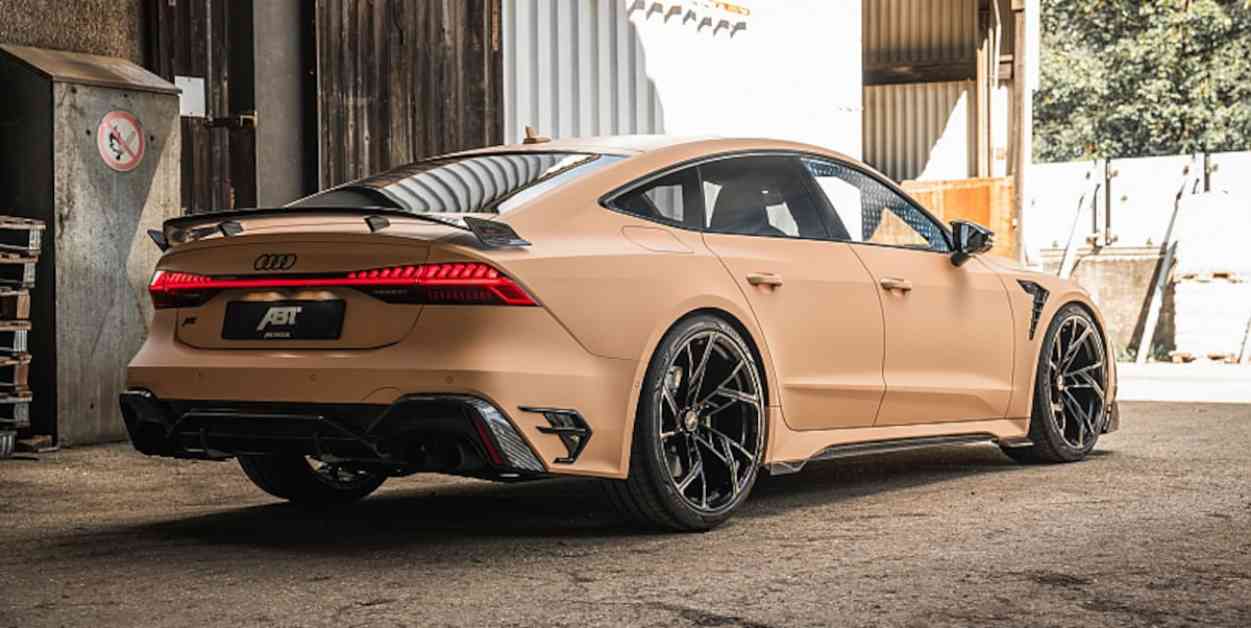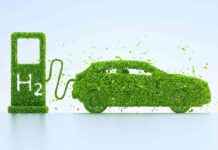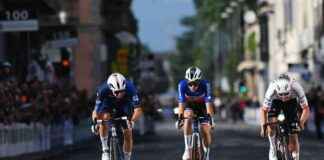Abt RS7-LE: Wolf in Audi Clothing – Review and Test Drive
Abt has taken the Audi RS 7 Sportback, given it a carbon aerodynamics kit, and added an indirect water/ethanol injection system. The result is a powerhouse with 1000 horsepower. Buckle up for this ride.
At first glance, this Audi RS7 may not seem extraordinary. The wrap reminds you of a camouflaged prototype, and the silhouette with the fixed rear spoiler resembles minor visual tuning. However, beneath this relatively ordinary exterior, which conceals the numerous carbon aerodynamic kit parts, lies a wolf in Audi clothing. This mobile Canis Lupus belongs to the Abt pack and marks its territory in the picturesque Allgäu region, specifically in Kempten.
Abt boosts the A7 with 1000 horsepower and an impressive injection technology
The tuning specialists have taken an Audi RS7 Sportback with 441 kW / 600 horsepower and, with the help of an IWI system (Indirect Water/Ethanol Injection), pushed it to up to 735 kW / 1000 horsepower and a maximum torque of a whopping 1150 Newton-meters from the four-liter V8 engine.
Water-ethanol mixture releases extra vitamins
The principle behind the Indirect Water/Ethanol Injection system is simple and is already evident in its name. The water-ethanol mixture is supplied before the throttle valves, cooling the air additionally and releasing extra vitamins. To ensure smooth operation, Abt has developed a control unit for this process. Additionally, technicians install a special charge air cooler and an additional oil cooler.
This creates a performance-enhancing domino effect. In addition to the more efficient fuel combustion, temperatures in the intake manifold, combustion chamber, and exhaust system decrease, reducing thermal stress and ensuring the system’s long-distance capability.
Domino effect under the hood – for 3000 kilometers
A tank in the spare tire well of the trunk contains the performance-enhancing mixture for a range of around 3000 kilometers. Refueling is done through the Ad-Blue additional tank filler, originally intended for Audi A7 diesel models. Upon delivery of the vehicle, the customer receives a 50-liter barrel. When the supply runs low, a simple order through the MyAbt app brings the refill home.
Engine must be broken in before conversion
However, the Allgäu technicians only accept engines that have run a maximum of 15,000 kilometers. These engines are then completely disassembled to prepare them for the power boost. Only then does the power operation yield the desired results. Ball-bearing turbochargers and forged pistons are used. Reinforced connecting rods and piston pins ensure durability. To allow the powerhouse under the hood to breathe freely, the tuning specialists have enlarged the air intakes, installed a carbon intake system, and a special exhaust system. The cylinder liners are honed if necessary. This demonstrates that every detail matters in cooling the high-performance engine.
Just to reiterate, the Audi RS 7 Sportback with 441 kW / 600 horsepower is anything but a sluggish vehicle. The Abbots transform this power into an Allgäu trinity with 603 kW / 820 horsepower in stage one (always present), 691 kW / 940 horsepower in stage two, and ultimately the brutal 735 kW / 1000 horsepower as maximum power. To achieve this top power, along with the torque of 1150 Newton-meters, you must fill up with 102 octane gasoline. If you opt for 98-octane fuel, you’ll get the mentioned 691 kW / 940 horsepower and 1050 Nm. Still more than enough.
When the Abt wolf bares its teeth
Enough theory, let’s talk practice. We warm up ourselves and the drivetrain on picturesque country roads and realize that the Abt RS 7 is not only quick in a straight line but also agile in corners. The extra lap serves another purpose. The system cannot be activated until the oil temperature reaches 80 degrees. To help the driver monitor the values and unlock the extra vitamins, Abt has developed an app that projects the displays via Apple CarPlay onto the infotainment screen. Once everything is ready, you activate the system using the RS button on the touchscreen. Initially set to 940 horsepower, when you activate the Race mode, the Abt wolf bares its teeth, and the full muscle power is available. Sounds intense. It is. In just 3.0 seconds, you reach 100 km/h from a standstill, and the surge continues up to 330 km/h.
180 km/h feels like 60
We cruise on the highway. Or so it seems. Because 180 km/h feels like 60 km/h. The Abt RS-7-LE 1000 is stable, with a sporty yet comfortable suspension. A glance at the system displays signals readiness. The speed has dropped to 150 km/h in the meantime. We step on the gas pedal, and within the next second, we are pushed back into the sports seats. Action equals reaction. To handle the torque’s force, the tires grip the asphalt, and the Abt Audi takes off as if there’s no tomorrow. The sound is pure combustion adrenaline.
The turbochargers whine, the four-liter V8 engine gulps, sucks, and gasps for air. Accompanied by the bassy sound of the exhaust system. Yet, even this acoustic spectacle plays second fiddle to the Sportback’s sprinting qualities.
Acceleration above 200 km/h is phenomenal
While the acceleration from zero to a hundred is impressive, the pull beyond 200 km/h takes your breath away and brings tears of joy to your eyes. This force in the upper speed range is impressive! The Abt RS-7 always remains stable and poses no problems for the driver.
All is wonderful. But such fun comes at a price: Abt’s tuning costs 205,000 euros, excluding the car. The Audi RS 7 Sportback, priced at 130,500 euros, adds to the total. Summing it up, that’s 335,500 euros. A hefty sum. However, for that price, you get a car that can compete with any supercar, is absolutely suitable for everyday use, and offers pure understatement on demand. The success of this formula is evident when you peek into the assembly hall in Kempten. The Abt RS-7-LE 1000 is a top seller. The ready-to-convert racing cars line up there.
By Wolfgang Gomoll
Translated and adapted by [Your Name]

















